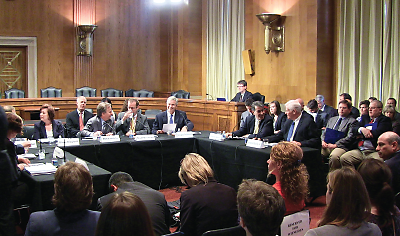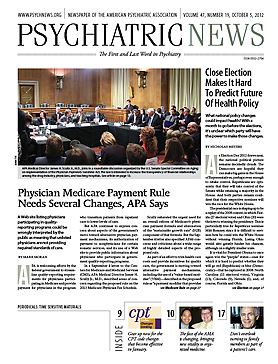Physician groups, including APA, expressed support for the Physician Payments Sunshine Act during a Capitol Hill “roundtable discussion,” but urged that the law be implemented so as to protect physicians’ right to due process and ensure accurate reporting by industry.
APA Medical Director James H. Scully Jr., M.D., joined representatives last month from the AMA, academic medicine, the pharmaceutical industry, and government agencies for a roundtable hosted by the U.S. Senate Select Committee on Aging and titled “Let the Sunshine In: Implementing the Physician Payments Sunshine Act” (PPSA). Enacted in 2010 as part of the Patient Protection and Affordable Care Act, the PPSA is designed to increase the transparency of financial relationships among the drug industry, physicians, and teaching hospitals.
“The roundtable had diverse membership,” Scully told Psychiatric News. “All are supportive of public disclosure of financial relationships between industry and physicians, but the physician groups are concerned about accuracy of reports and the need for clear dispute resolution that is timely and fair before reports are made public. There is special concern about reporting research funding, and most agreed that this aspect should be treated separately.”
In his remarks to the roundtable, Scully noted that in 2009 the APA Board of Trustees opted to terminate industry-supported education and industry-supported meals at APA meetings, prior to and independent of enactment by Congress of the PPSA.
“While supporting education, training, and career development for our members is a critical goal, we wanted to ensure that we could achieve this goal without eroding the public trust in our profession,” he said. “Therefore, we decided to make a clear separation. The separation has not been supported by all of our members, and it has not been without notable cost to APA. However, we feel that the decision was good and worthwhile.”
Scully said APA supports the intent of the PPSA, but he outlined three recommendations regarding implementation of the law.
Development of a formal and swift dispute resolution process that does not place a presumption of error or impose additional costs on a physician seeking to rectify a manufacturer’s reporting inaccuracies.
An increase in the time allowed to physicians to review a manufacturer’s report. The law currently provides 45 days, which may not give physicians sufficient time to identify and correct inaccurate reporting data.
The need for “real-time” notifications to physicians when a manufacturer’s report mentions payments made to them; this would ensure both the physician’s right to due process and more accurate reporting data.
Scully also emphasized that the funding physicians and institutions receive to do research should be treated with special consideration in the final rule that is being written by the government to implement the PPSA. (The Centers for Medicare and Medicaid Services has issued an “interim rule” to which APA has responded with comments.)
“Medical research at teaching hospitals, medical schools, and other similar institutions could be adversely affected if indirect payments are ultimately included in the final reporting requirements,” Scully told the group. “Research funding by nature is very complicated.”
For instance, he noted that requiring physicians or institutions to attribute value to an average industry-awarded research grant would be unusually burdensome on the grant recipient, shifting significant personnel resources away from research activities.
“The burdensome reporting requirements undoubtedly will discourage some leading medical researchers from pursuing funding opportunities provided by industry that may be impossible to match from other sources,” Scully said. “While it is important to promote transparency, we don’t want to cross a line where we end up inhibiting cutting-edge medical research that benefits our patient population.”
Psychiatrist and AMA President Jeremy Lazarus, M.D., echoed many of Scully’s concerns and noted that the AMA House of Delegates last year approved a report from the AMA Council on Ethical and Judicial Affairs titled “Financial Relationships With Industry in Continuing Medical Education (CME).”
That report asserted that when possible, CME should be provided without the financial support of industry or the participation of individuals who have financial interests in the educational subject matter (Psychiatric News, July 15, 2011).
At the roundtable, Lazarus noted that the Centers for Medicare and Medicaid Services in its interim rule has proposed reporting standards that will include indirect transfers that occur through “certified CME,” even though the statutory language of the PPSA does not support such an interpretation.
(“Certified CME” programs are those offered by accredited CME providers and certified by the AMA for the AMA Physicians Recognition Award PRA Category 1 Credit. Certified programs must comply with independence standards set by the Accreditation Council for Continuing Medical Education, as well as the AMA’s Code of Medical Ethics.)
“The AMA agrees that other educational activities including those that are characterized as CME—but which are not certified—could be subject to reporting as there could be direct transfers of value to individual physicians and industry that could control and/or influence the content of the educational materials.”
But Lazarus added, “Certified CME is independent, and manufacturers have no control or input into the content, the speakers, or the attendees. … [C]ertified CME is not covered by the sunshine act, and CMS should make this clear…. We urge CMS to exclude from reporting certified CME as this is a reasonable interpretation of the statute as well as the legislative history.”


